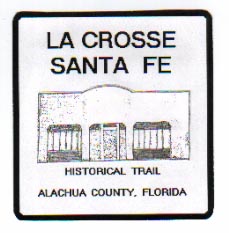
Instructions.
1....Print this file.
2....At its end,click on "rules" to see a copy of the trail rules, print it, and then click where indicated at the end of the 3-page rules and patch order form to get back to the list of Florida trails.
3....If you want a hand-drawn map showing the locations of all of the sites, send a self-addressed stamped envelope to Steve Rajtar, 1614 Bimini Dr., Orlando, FL 32806.
4....Hike the trail and order whatever patches you like (optional).
WARNING - This trail may pass through one or more neighborhoods which, although full of history, may now be unsafe for individuals on foot, or which may make you feel unsafe there. Hikers have been approached by individuals who have asked for handouts or who have inquired (not always in a friendly manner) why the hikers are in their neighborhood. Drugs and other inappropriate items have been found by hikers in some neighborhoods. It is suggested that you drive the hike routes first to see if you will feel comfortable walking them and, if you don't think it's a good place for you walk, you might want to consider (1) traveling with a large group, (2) doing the route on bicycles, or (3) choosing another hike route. The degree of comfort will vary with the individual and with the time and season of the hike, so you need to make the determination using your best judgment. If you hike the trail, you accept all risks involved.
Cotton was the chief crop of LaCrosse, but was eliminated by the boll weevil. Early in the 1900s, it was replaced by potatoes as the main agricultural product. During the 1920s, its growers organized the LaCrosse Potato Growers Association, which built this brick office near the railroad and the packing house.
During the Depression, potatoes became less profitable. The building was later acquired by Roy Cellon, a descendant of John A. Cellon, one of the founders of LaCrosse who arrived here in about 1830.
This house was built in about 1900, and it is typical of the frame dwellings built about that time. There is doubt as to who was the original owner, but it was acquired later by W.W. Newbern. In 1945, he sold it to Joseph S. Imler, and it was later occupied by his son, Thomas Imler.
Santa Fe was settled in the 1890s by Edwin L. Blitch, who owned the general store which contained the post office, of which he was the postmaster.
The Methodist Episcopal Church was organized before 1894, and early services were held in the large hall of Henry Clay Parker, the brother of pioneer Richard H. Parker, who settled here in 1845. Later, this church building was erected and it served the congregation until the 1930s. Since then, it has been used from time to time as a residence.
This was a typical service garage and filling station during the era of the early automobiles. It was erected in the 1920s by R.H. Tipton, and was later operated by Tatum Norris. It ceased serving as a garage during the 1960s.
This Baptist church was organized during 1883, and this building was constructed of heart pine on land donated by Henry Clay Parker. This building continues to be the home of the congregation.
In about 1925, this general store was built by Will W. Roberts and was later run by Tatum Norris, his son-in-law. This was later the home and plant nursery of the Bass family.
This was the site of the drug store of Dr. W.S. Roberts, and later E.S. Gainey had a grocery store here. Jasper "Jap" Harris was a native of LaCrosse who entered the turpentine business during the early 1900s, and used this building as his commissary. He also served as a member of the Florida House of Representatives for 3 years.
During the 1920s, this was the site of the general store of Clarence Asa Chapman, later operated by his son, Jay G. Chapman. The present building, erected here in the 1940s, later served as the Santa Fe Baptist Church.
This is believed to be the oldest house in town, built in about 1880. J.E. Futch probably lived here, and had his cotton gin just to the west of this house. In the 1920s and 1930s, it was the home of Seaboard Railroad employee Benjamin H. Boyles. Later, it was owned by the Millings family.
Alachua County, Florida Historical Tour Series: Alachua, Hague, High Springs, LaCrosse, Santa Fe, Bellamy Road & Traxler, by Alachua County Historical Commission (1984)